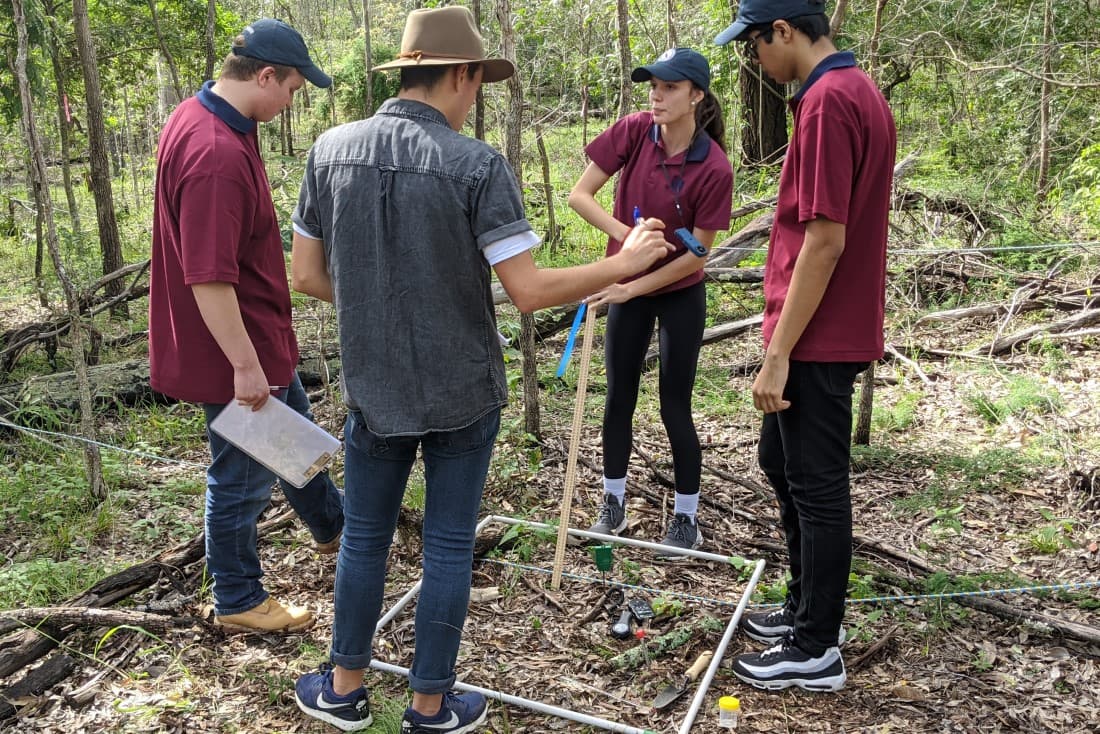
Bring science to life
Introduce your students to our unique living laboratory at the Samford Ecological Research Facility (SERF) to complete their Biology Unit 3 mandatory practicals.
QUT is supporting schools with facilitated day visits to assist in the completion of some of their Biology Unit 3 mandatory practicals. Students will complete these practicals at QUT’s real-world research site the Samford Ecological Research Facility (SERF).
The visit
Schools can choose one of two options for their day visit.
Option 1 – Plants on the edge
Plants on the edge is a whole day program where students examine vegetation characteristics along the transition between a disturbed and undisturbed dry sclerophyll forest at QUT's SERF. All survey equipment will be provided. All resources, including student handbooks, two pre-trip lectures and one post-trip lecture will also be provided as soon as the schools attendance is confirmed.
Students will learn and implement a range of ecological sampling techniques and these activities cover some of the subject matter and mandatory practicals outlined in Senior Biology Unit 3 (Topics 1 and 2) curriculum.
Option 2 – Student-led data collection
A whole day program where students (in groups) extend/modify an existing survey methodology to answer their own scientific question they have developed in class. Unless otherwise specified by the teachers, students will extend on the methodology used in the Option 1 - Plants on the edge practical.
All learning resources associated with option 1 (except the data analysis lecture), as well as student handbooks for this practical will be provided as soon as the schools attendance is confirmed. Survey equipment is provided; however students may like to bring additional equipment depending on their question.
To support completion of the Summative Internal Assessment (IA2): Modify (i.e. refine, extend or redirect) an experiment in order to address your own related hypothesis or question.
Preparing for your visit
Prior to the visit we will provide further resources and information, including a:
- detailed itinerary
- Lecture 1 – Designing and ecological question and survey
- Lecture 2 – Plants on the edge: Practical overview and equipment run down
- Lecture 3 – Data analysis and interpretation (for option 1 only)
- plant field guide
- digital copy of the student work booklet
- school guide containing important details to help you prepare for your visit.
All of the equipment needed for the mandatory practicals will be supplied by QUT. Alternatively, schools may bring their own equipment. Make sure you read the essential information (PDF file, 230.7 KB).
A QUT student ambassador will also be onsite to facilitate your field trip and assist with equipment use. Active participation of all attending teachers is required to help students gather sufficient and relevant data to formulate their questions onsite or back at school.
About SERF
The Samford Ecological Research Facility (SERF) is a living laboratory for research and teaching across ecology, urban planning, agriculture, engineering and more.
The property was generously bequeathed to QUT in 2009 by the estate of renowned Queensland entomologist Dr Elizabeth Nesta Marks AO. Managed by QUT's research division, the 51-hectare property is located in the Samford Valley.
Bookings
Bookings are available for Term 1, 2025
The site can facilitate up to 60 students per day. You can book multiple days if you have more than 60 students.
Times
Approximately 9am to 2.30pm.
Fees
$450 per day per school.
Payment is required in full before your field trip and includes a non-refundable deposit of $100 for cancellations.
Schools are responsible for their own transport arrangements to and from the site.
QUT has a commitment to aspiration and inclusion and aims to support students from low socio-economic, rural, Indigenous and Pasifika backgrounds. Fees subsidies may apply for widening participation schools. Faculty of Science Engagement Team at engage.science@qut.edu.au for more information.
Ready to book?
Book your field trip via our booking form.
Essential information
Make sure you read the essential information (PDF file, 230.7 KB) before you plan your visit.
Curriculum links
Students who complete Option 1 - Plants on the edge will learn and implement a range of ecological sampling techniques and these activities cover some of the subject matter and mandatory practicals outlined in Senior Biology Unit 3 (topics 1 and 2) curriculum. Those which are covered in this option are as follows (as written in curriculum):
Senior Biology: Unit 3
Topic 1: Describing biodiversity; Biodiversity
- Subject matter: determine diversity of species using measures such as species richness, evenness (relative species abundance), percentage cover, percentage frequency and Simpson’s diversity Index.
- Subject matter: explain how environmental factors limit the distribution and abundance of species in an ecosystem.
- Mandatory practical: Determine species diversity of a group of organisms based on a given Index.
- Suggested practical: Measure abiotic factors in the field (e.g., dissolved oxygen, light, temperature, wind speed, infiltration rate).
Topic 2: Ecosystem dynamics; Changing ecosystems
- Mandatory practical: Select and appraise an ecological surveying technique to analyse species diversity between two spatially variant ecosystems of the same classification (e.g. a disturbed and undisturbed dry sclerophyll forest).